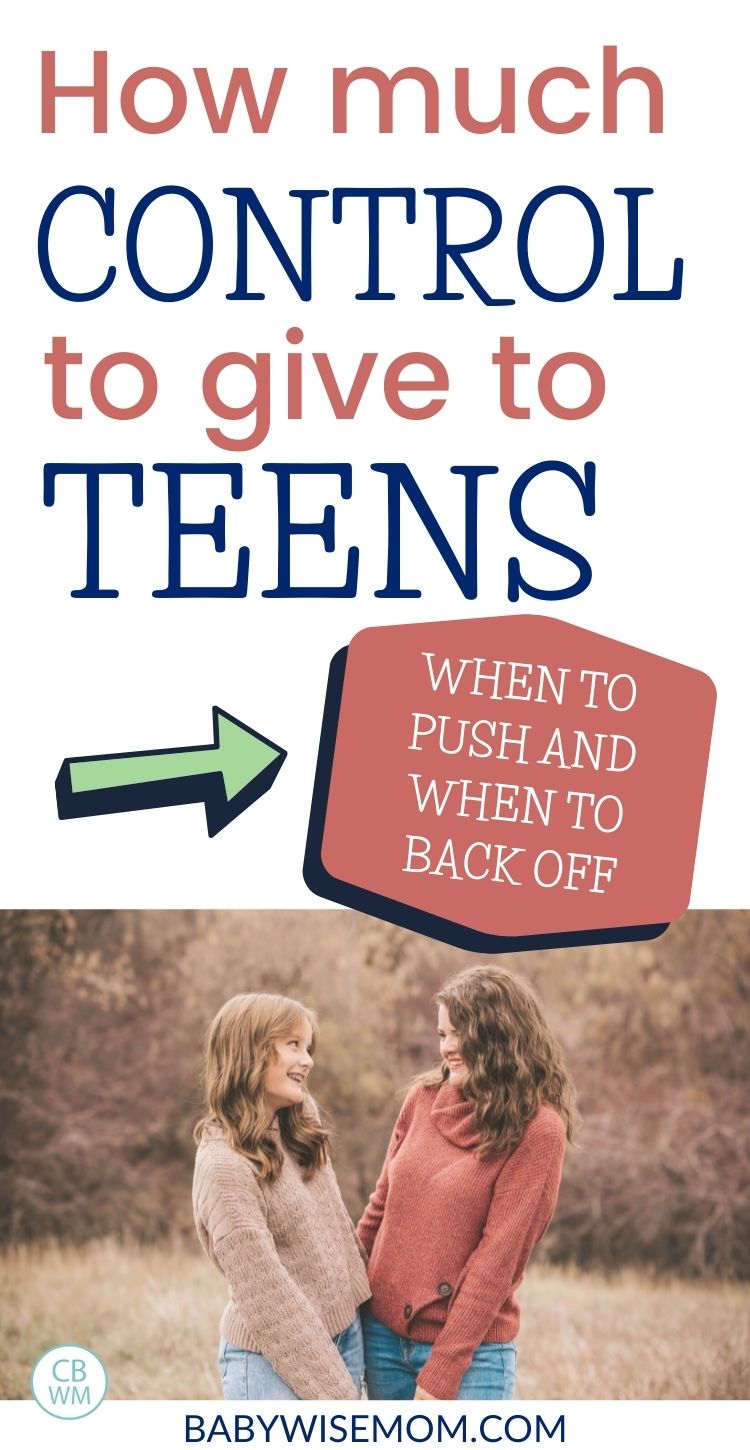As hard as it is, teenagers need to be given control and allowed to make their own decisions. Find out when to back off and when to press.

One very cold day this past January, when it was a balmy -1 degree Fahrenheit, I posted a picture of McKenna as she was about to walk out the door to go to school on Instagram.
She had no coat on, as teenagers often don’t. I asked her if she was sure she didn’t want a coat. She replied, “I have a shirt on under my sweatshirt.”
No biggie.
Sweatshirt plus t-shirt definitely holds up to below 0 temperatures.
This post sparked a lot of interest with people asking me if I made her wear a coat.
No, I didn’t.
Then people wanted to know when to press your tween or teen to do something and when to back off.

Post Contents
- The Progression of Parenting
- Teens Need Control
- You Still Establish Rules and Limits
- Technology Use
- Drugs and Alcohol
- Car and Driving Privileges
- Sleep and Health Requirements
- Curfew
- Morality Expectations
- Other Concerns
- Allow Your Teen to Make Mistakes
- Offer Support and Advice
- When To Press
- When To Back Off
- Conclusion
- Related Posts
The Progression of Parenting
From the time your baby is born, you are working as a parent to raise your child to someday move out of the house and be a responsible adult who contributes to society in a positive way.
In order to do this, your child must be independent and know how to make decisions.
Your newborn starts off being completely helpless and dependent on you for absolutely everything. Your new baby can’t even intentionally lift an arm or a leg to assist in getting dressed.
You work through those baby months to get your baby to be able to roll over, sit up, feed herself, talk (express herself), move from one place to another.
You lead your child through every step.
As the years pass, the independence grows and the dependence lessens.
You start to allow some simple choices to be made throughout childhood. You move more toward a role where you guide more than you lead. You transition to have less control as the years pass.
You are aiming to eventually walk beside your child someday.
All experts agree that the best way to parent is as an Authoritative Parent. Make sure you understand what this means and what it looks like and work to be that parent.
>>>Read: How To Be an Authoritative Parent
Teens Need Control
The fact is that teens need control.
The natural growing-up process involves a teenager pulling away from the parents and starting to have some level of independence.
They will take it at some point. You can either work with this natural process or against it, but it will happen. If you work against it, you will alienate your child and create a lot of contention and conflict.
You still get to have rules and limits (more on that below), but you need to start to give some control.
In these teen years, the stakes are still low. I have talked about allowing children to make mistakes while the stakes are low (this philosophy is discussed in the book Parenting with Love and Logic).
There will come a day that your child will be an adult and will be expected to make decisions. Big decisions. Many of these life-altering decisions come way before “adulthood”.
Where to go to school? What career to pursue? Where to live? Who to marry?
These big decisions are peppered with many small decisions. And once your child is an adult and working and raising a family, there will be many more decisions that will have an impact those around them.
Your teen NEEDS to learn how to make decisions. Your teen NEEDS to learn how to manage life. Your teen NEEDS to understand that decisions have consequences.
Do you know any adults who cannot make a decision? Even something as simple as “where should we go out to eat” can be a paralyzing concept.
Deciding which brand of peanut butter to buy at the grocery store can be too much.
These adults exist because they were not allowed to make decisions in life. They were controlled and told what to do and when to do it. On the rare occasion they were allowed a choice, they were heavily berated if they made the “wrong” choice.
And of course you know of young people who were heavily controlled and rebelled. Rebelling is a was young people try to grasp some control
Humans crave agency. They will fight against anyone who tries to remove that from them.
Research shows that teens who have control in life–the freedom to make decisions (agency)– will have less drug use, have better grades, be emotionally stable, and be intrinsically motivated (to name a few).
Your teen will listen to you and your advice more when they actually have a choice.
Once kids reach adolescence, they need to be managing their own lives more.
As you give your teen the freedom to make decisions, you must also expect your teen to face the consequences of actions.
If your teen decides to skip practice to do something else, require your teen to be the one to communicate that to the coach. And require honesty. If your teen wants to be able to makeher own decisions about her life, she needs to face the full reality of what it means to do so.
>>>Read: Weekend Routines for Older Kids
You Still Establish Rules and Limits
In order to have a true choice, there do need to be boundaries, rules, and limits.
Even adults have rules we have to follow. Teens are no different.
The teen brain is not yet fully developed. In fact, a teenager makes decisions with the emotional part of the brain, while adults make decisions with the logical part of the brain.
When you have teens, you will have moments when you say, “What were you thinking?!?!?!?”
And your teen will not have a real answer. Because he wasn’t.
While your child needs more freedom than he had as a toddler or tween, he should not have the freedom he will enjoy (and shoulder) as an adult.
You should absolutely set some ground rules.
Studies show that a teenager is less likely to use drugs or alcohol when they know their parents do not approve of the usage. Alcohol use goes up if the parents say nothing.
Do not be afraid to set rules and limits. There are risky behaviors that a teen should not be participating in.
>>>Read: How To Best Handle Teen Backtalk
Some topics it is wise to set some rules, limits, and boundaries on include the following:
Technology Use
When can your teen have a cell phone? Does it need to be turned in at night? Can it go in a bedroom? Is it allowed at the dinner table?
Are there limits to how much technology can be consumed in a day?
Do you have restrictions on when and if your child can have social media accounts?
The hard thing about parenting is there is no one-size-fits-all set of rules for all families. You might even have different rules for different children.
With that said, I would highly encourage you to have some rules and boundaries for technology.
It is okay if your child is the “only one” who doesn’t get to [fill in the blank here]. The truth is, your child isn’t the only one.
We do not allow the internet into bedrooms. The internet needs to stay in public places.
We do not allow phones to stay with kids through the night. Electronic devices have a curfew and must be turned in at our house.
We do not allow social media accounts at all until the child is a sophomore in high school. At that point, it is very limited.
We have limits to how much time can be spent on technology.
We have a week every month when we have a “technology fast.”
Teenagers need a break from friends and social pressures of school. They need a chance for the world to be quiet.
The noise of technology needs to be turned off in order for them to actually think and process decisions.
Drugs and Alcohol
Do you have clear expectations on the use of drugs, tobacco, and alcohol? Are you okay with smoking? Make them known to your children.
Car and Driving Privileges
Set some rules and expectations for driving. I have gone into depth on this topic and even have a free printable for you in this post: Teen Driving Contract (with free printable)
Sleep and Health Requirements
Healthy sleep habits are a big deal to me. My children have spent their lives being well-rested and so far have not enjoyed the feeling of being tired when they become teens.
As our tweens move into the teenage years, we allow them to set their own bedtime.
Because they do not like to be tired, they set very reasonable bedtimes for themselves.
If I had a teen struggling with going to sleep, I would make it clear that it is expected that the teen makes it to school on time. I would have a weekend wake-up time to get the day going.
Have a time technology needs to be turned off and turned in definitely helps teens just go to bed. It isn’t as fun to stay up without technology.
Curfew
It is wise to have a curfew for your teenager. So far for us, our teens come home at very reasonable times so we don’t have an official stated curfew. It is more “unstated” at this point.
It would be wise to state one, but at the same time, I am happy with the times they have chosen to come home.
>>>Read: Should You Give Your Teenager a Curfew?
Morality Expectations
Make sure your teen knows your expectations as far as moral issues go. You will want to have some rules that help support your child to keep these morality rules.
This can include when your child can date as well as rules and guidelines for going on dates.
Other Concerns
There might be other concerns you will establish rules with. You might have expectations for grades, homework, time spent with friends, finances, jobs, chores, etc.
As you set your rules, make sure you adjust them for age. Also, listen if your child has a proposal for a change.
Listening does not mean you have to say yes, but it shows your child you have respect for them and rust in them.
Allow Your Teen to Make Mistakes
One of the hardest elements to allowing agency to be real is allowing mistakes to happen and then allowing the consequences to follow.
You cannot rescue your teen from the consequences of the actions.
Your teen cannot learn to make decisions without also understanding that there are consequences for decisions. Sometimes they are positive, sometimes they are negative, and sometimes they are neutral. Oftentimes, they are a little of all three.
Offer Support and Advice
As your teen makes decisions, offer your support. When a negative consequence follows a poor decision, don’t rub it in your teen’s face. Help your teen learn how to work through the negative consequence.
These are wonderful learning opportunities.
If your teen wants advice, give it.
If you see a big pitfall ahead, share that. Do so in a “it is still your decision” sort of way. But share your guidance.
Share experiences from your own life. How did you handle the decision? What were the consequences? How did you feel about the result?
What would you do if you were in your child’s position?
Give your child suggestions for other trusted adults who might be able to offer some guidance. School counselors can be a great resource. Your child’s pediatrician can provide sound information.
Coaches, teachers, and church leaders are all people who can offer perspective and help. Mom is a great resource, as is dad, but it takes a village. Use it.
Encourage your teen to be prayerful about decisions if that is something your family does. I always encourage my kids to think about the decision, weigh the options, and be prayerful about it.
As you give your child support, that doesn’t mean you have to make a decision happen if you don’t agree with it.
You do not have to drive your child somewhere you don’t think is a good idea.
You do not have to financially pay for your child to go to a concert you don’t approve of.
When To Press
Once again, a teenager is not an adult yet. There will be times you do have to press and exert some control.
You will need to press if rules or limits are violated. If you have set clear rules, boundaries, and expectations, there should be consequences that follow when those are not followed.
As you press in these moments, make it clear as to why. Outline what happened.
Always remain calm.
The conversation will go much better if emotions remain in check.
If you can’t be calm, tell your teen you will need to table the conversation and return it a little later when you have calmed down. Your teenager will not mind!
As you discuss the situation, make sure it is a discussion. Ask your child if she thinks you are being unfair given the situation. We have never asked our teens that and had them say “yes.”
You also need to step in and press if you see real danger. This can be physical, emotional, or moral. Again, a teenager does not always make wise decisions. It isn’t always physically possible for your teen to do so.
I also recommend you press things if your teen can’t express “why” they do or do not want to do something. Require more.
Part of making a decision is understanding the reasoning for it. Dig down with your teen and figure out the why.
If you feel concerned about your child’s behavior, press. If you see warning signs and feel like something is wrong, trust your intuition and follow through.
If you see a change in your teen’s mood, press. If you notice anxiety or depression, you should step in and do what you can to help.
When To Back Off
There are many times you need to back off and let your teen have control.
Step back and think “does it really matter?”
As we go back to McKenna and the coat, did that really matter?
No.
That is why I didn’t push it.
She would probably be cold. If she had texted me from the bus stop and asked me to bring her a coat, I would have declined. That might seem harsh, but it goes back to understanding the consequences.
If she had been headed out on a winter hike with friends, I would have insisted she wear a coat. Then it would have mattered. 5 minutes in the cold…didn’t matter.
You also need to ask yourself if you are worried about your child or your own reputation?
Are you worried about being judged?
With the coat example, if I had forced the coat issue, would it have been so that the neighbors, bus driver, and teachers at the middle school wouldn’t think I was a neglectful mother?
Would it have been so everyone could see what an attentive and successful mother I was because I actually got a middle schooler to wear a coat?
Just as you want to make sure the child can express “why”, you need to be able to do so, also.
Back off when the stakes are low and your child can use it as a learning opportunity.
Conclusion
As your teenager learns to make decisions and has some control, he will learn self-discipline. Remember to respect all aspects of agency. Allow the freedom to choose and allow the consequences of the decisions to be felt.
Trust your teen and also trust your own instincts.
This is not easy. I hear from older friends that parenting adult children is even harder because you have even less control. You both need to go through this transition to maintain a healthy relationship now and years to come.
Related Posts
- How to Respond to “Everyone Else is Doing It”
- When Can a Child Stay Home Alone?
- Sleep Tips and Needs for Teens and Tweens
- Have a New Teenager By Friday Book Review
- How To Successfully Combat Teen Attitude

